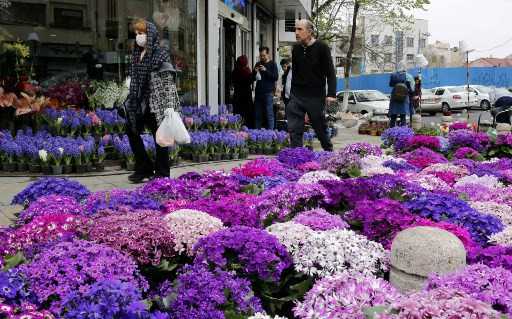Calls and messages replace Iranian New Year's gathering amid COVID-19 pandemic
23 March, 2020

If there was a very important factor that Mohammad Azad was supposed to do in his first year as Iranian Ambassador in Jakarta, it would have been to host a gathering of compatriots, colleagues and like-minded friends to celebrate the Persian New Year.
But the senior diplomat finally decided against it amid the heightened risks of COVID-19 infection, which includes spread to more than 246,000 people worldwide.
The Persian begin to the calendar, commemorated globally as the International Day of Nowruz, could be literally translated as "New Day". It really is a historical celebration and the largest national holiday in Iran, where families gather in high spirits to dine and exchange gifts.
Within their homes, Iranians would assemble their haft sin, a traditional tabletop arrangement of seven items marking the celebration of the holiday. The names of the seven items must start with the Persian letter seen (s) and each item represents a different expect the New Year.
The four most common items are sabzeh (grass), symbolizing rebirth and renewal; senjed (dried fruit), symbolizing love; sib (apples), symbolizing beauty and health; and seer (garlic), symbolizing medicine and self-care.
This year 2010, Nowruz was acknowledged by the US General Assembly as a spring festival of Iranian origin that is celebrated for a lot more than 3,000 years. It has turned into a public holiday in other countries, including Afghanistan, Azerbaijan, Kazakhstan and Turkmenistan.
However, this year's celebration, which falls on Saturday, has been overshadowed by the global COVID-19 pandemic, as Iran becomes one of the world's hardest-hit countries with contamination rate of 50 people per hour and a death toll of 1 1,284 that continues to climb for a price of 1 person every 10 minutes, Reuters reports.
Meanwhile in Indonesia, there are 369 persons who've tested positive for the condition and 32 who have died as of Friday afternoon, rendering it the best fatality rate on the globe - barring all unconfirmed or probable cases.
This situation has driven Azad to decide that rather than hosting the customary gathering of the Iranian community and other friends at his official residence in Menteng, Central Jakarta, he'd send them well wishes through letters, voice notes and phone calls.
“Due to the new situation, I've sent voice notes and messages to your Iranian communities. In my own message, I said that due to the coronavirus we must be careful and to manage that, we will have this exchange of messages,” the envoy told The Jakarta Post on Friday, discussing the virus that triggers COVID-19.
The Iranian people celebrate Nowruz just how Idul Fitri is celebrated in Indonesia, at relatives and friends. Many people usually extend their holidays for two weeks, using that time to visit family and friends and travel out of town to tourist spots and/or religious sites.
“I hope that whenever we've managed [to contain] the coronavirus, we are able to have another festival - maybe after Ramadan and during Idul Fitri. Hopefully, [by] that time we are able to [...] have face-to-face interactions,” Azad said.
Idul Fitri is the biggest holiday on the Islamic calendar, which celebrates the victory of the spirit towards the end of a month-long fast undertaken globally during the holy month of Ramadan. This year it will likely fall on May 28.
Meanwhile in Iran, millions of men and women are now confined to celebrating the brand new Year of their own walls, although the police have said that many still defied warnings from health officials to remain home and prevent crowds by going to the Caspian coast, a favorite destination through the Nowruz holidays, according to Reuters.
Indonesia has imposed a short-term travel ban for individuals with a history of happen to be Iran, together with countries like Italy and South Korea which have been hit the hardest by COVID-19, in its efforts to curb the spread of the condition in the archipelago.
Foreign Minister Retno LP Marsudi called her Iranian counterpart on Wednesday, expressing condolences for the deaths due to the COVID-19 outbreak in Iran, said the ministry’s director for Middle East affairs, Achmad Rizal Purnama. Retno also conveyed the importance of international cooperation in handling the outbreak, he said.
“The international cooperation aspect in overcoming this problem must continue being encouraged,” Rizal told reporters on Thursday.
From the Iranian side, Azad said his minister also used the chance to ask the Indonesian government never to follow the “unilateral [...] and inhumane sanctions" that america has imposed on the people of Iran, particularly given the spread of the pandemic.
He said the sanctions experienced an impact on the country's capability to procure the medical equipment necessary to respond to the general public health emergency, along with the massive pressure it puts on Iran's economy.
Reuters reported Friday that the US imposed new sanctions this week, arguing that its “maximum pressure” campaign to curb Iran’s nuclear, missile and regional activities does not stop the flow of humanitarian goods.
The Donald Trump administration blacklisted five companies located in the United Arab Emirates, three in mainland China, three in Hong Kong and one in South Africa for trade in Iran’s petrochemicals.
Source: www.thejakartapost.com
